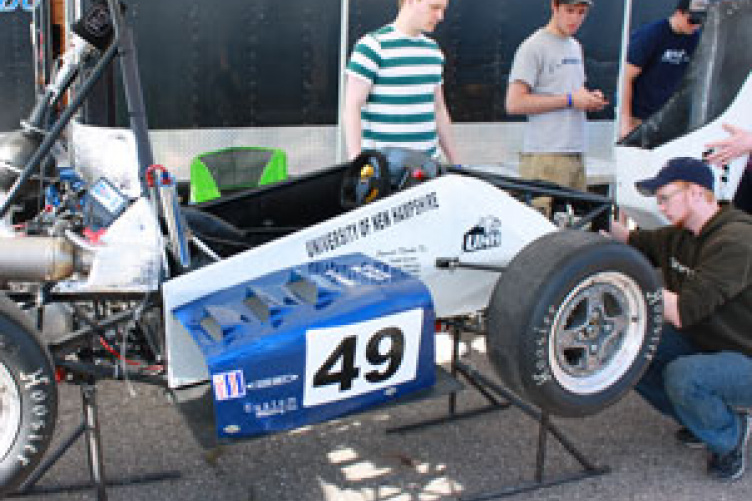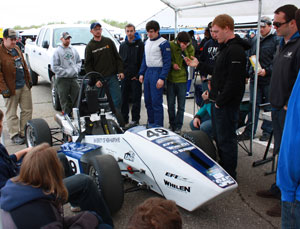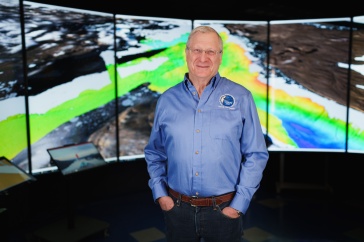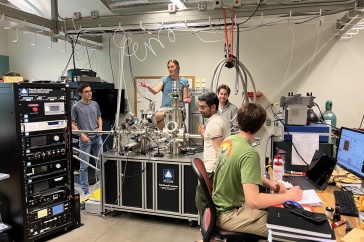
It’s a tale as old as David and Goliath, one that extols the flinty New Hampshire virtues of thrift and resourcefulness: A scrappy, underfunded team prevails against much more resourced competitors by relying heavily on smarts and heart. And, in the case of the University of New Hampshire Precision Racing team, by building and driving a race car faster than most of them.
While UNH Precision Racing has competed for a decade in the international Formula SAE competition, organized by the group formerly known as the Society of Automotive Engineers their recent trip to the Michigan International Speedway leapfrogged the team up in the rankings. Competing against 120 teams from universities around the world, the UNH car was ranked sixth for fuel efficiency, tied for 10th place in design, and came in 26th overall.
“In 10 years, this is the best we’ve ever done, by far,” says Tyler Young ’13, managerial captain and a four-year veteran of the team, which comprised 14 undergraduates – 12 mechanical engineering students and two electrical and computer engineering majors.
|
|
Young and his teammates are even prouder of their achievement as underdogs. Competing against some of the nation’s top universities and technical institutes, the UNH team’s “small-scale” budget of about $50,000 was a fraction of what most teams spent.
“We’re talking upwards of hundreds of thousands of dollars,” says Young, a mechanical engineering student.
Young attributes the team’s success to some radical overhauling of previous years’ cars. Moving from a four-cylinder to a one-cylinder motor “dropped 70 pounds but made more power,” he says. The redesigned frame, on the other hand, weighed more but was more rigid, and better aerodynamics and suspension worked in the team’s favor. And the car’s electronics, which measured everything from tire temperature to shock position, were “pretty unique,” Young says.
In the end, UNH’s Car 49 weighed in at 444 pounds and could accelerate from 0 to 60 miles per hour in under four seconds. While competition regulations put top speeds at 60 mph, ”I can gear it to go over 100 easily,” Young boasts.
Describing their team’s success, Young and George Hotton ’13, the team’s aerodynamics captain, are quick to note that teamwork, not technical prowess, was the team’s leading asset: “We all became friends really quickly,” Young says.
Working on the car – the team’s senior design project – since last summer, it’s hardly surprising the social dynamics among team members became paramount. “We were here 24-7, it seems like. When you’re on this team, you don’t do anything else,” says Young, an automotive enthusiast who spent many formative years at New Hampshire Motor Speedway near his home. “But even though we were always working, we were always working with friends.”
The team members are quick to recognize the benefits of their experience that go far beyond the finish line. The hands-on experience, both technical and managerial, grounds their education in the practical. “A lot of people have never stepped foot in a machine shop before this year,” Hotton says.
And the effort is launching careers, too. Young, whose managerial duties included securing corporate sponsors to help defray team costs, has a job lined up with one of them, Whelen Engineering in Charlestown. Hotton is debating between several job offers.
“Most of us have a pretty high success rate in getting jobs,” Young says.
Like its creators, Car 49 won’t be resting on its laurels. Tight budgets mean the students on next year’s Precision Racing Team will scrap it for parts.
In addition to Young and Hotton, members of the 2012-23 UNH Precision Racing team are Thomas Kimsey (technical captain and electronics lead), Newell Moser (frame lead), Michael Stevens (powertrain lead), Drummond Biles (controls lead), Ben Gardell, Ryan Carlson, Michael Lorenzo, Trevor Mutch, Sean McCann, Alex Rich, Kyle Steike, and Goran Vidic. The team credits mechanical engineering information technologist Sheldon Parent as essential to their success. Todd Gross, professor of mechanical engineering, is their advisor. Learn more at www.unh.edu/fsae.
Originally published by:
UNH Today
-
Written By:
Staff writer | Communications and Public Affairs

















































